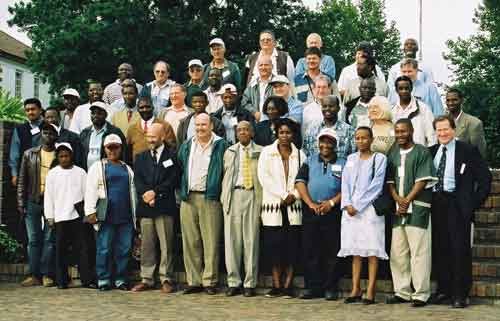 SANAT
- 10th Anniversary Workshop SANAT
- 10th Anniversary WorkshopSouth African Network of Animal Traction |
| Click here to see publications on animal traction in South Africa | ATNESA Home Page |
|
10th Anniversary SANAT Workshop Press Release A South African Network for Animal Traction (SANAT) workshop was held at the University of Fort Hare, Province of the Eastern Cape, South Africa from 3rd to 7th November 2003. The workshop was attended by 60 participants from 11 countries: South Africa, Zimbabwe, Zambia, Kenya, Tanzania, Madagascar, Namibia, Uganda, Lesotho, Scotland and England. The participants included: 14 farmers, both small-scale and commercial, government officials, researchers, promoters, NGO trainers and community development agents. The workshop was officially opened by Mr John Allwood, Director of Development in the Eastern Cape Department of Agriculture and Rural Development. The theme of the workshop was “New networking strategies for SANAT/ATNESA, which will place animal traction at the fore front of sustainable development in the 21st century”. The main objective of the workshop was to bring together farmers, national, regional as well as international specialists involved in training, research, policy making, development and extension relating to animal traction. Specifically the workshop was aimed at:
The participants shared experiences and achievements in promotion and support of animal traction in their various operation areas. The workshop also shared present and future needs and requirements in improving draft animal power utilization and management. A strategic program was proposed which will enable SANAT and ATNESA to
fulfil their roles as dynamic, effective and representative networking organizations which can guide the progress of animal traction.
The need for a policy on animal traction was identified as an essential component in empowering rural communities. It was also necessary to foster research and training and extension support at a national level. The importance of linkages and networking with institutions and various organizations undertaking relevant research and development cannot be over emphasized. This was identified as a vital element in ensuring that potential applications are
channelled to target groups. |
|
| Return to
SANAT Home Page |
|
| |
|
Comments,
corrections and feedback relating to this website are welcome |
